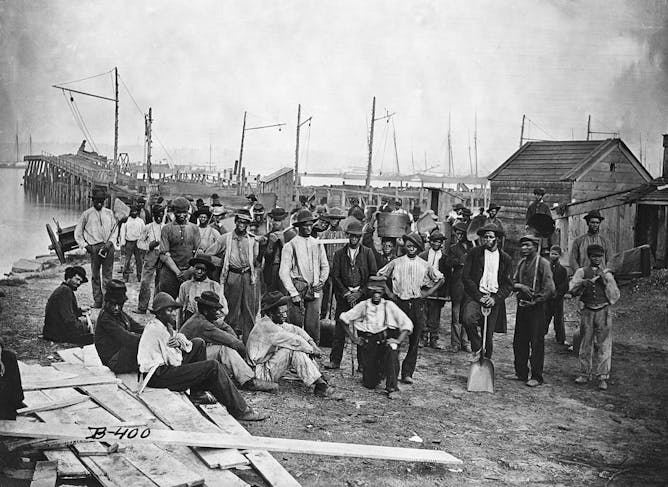|
Top headlines
Lead story
Learning about slavery isn’t easy. Even when teachers, book authors or the media get the story right, revisiting this dark chapter in America’s history can be a painful experience for a Black child. I know because I recall how upset I felt the first time I saw “Roots,” a 1977 TV miniseries based on the work of Alex Haley, when it re-aired several years later around the time I was 10. The parts that affected me the most were the various scenes that implied the rape of Black women and girls at the hands of white slave owners and overseers. That’s a lot for anyone to process but especially for a Black child growing up and trying to make sense of race and racism in the nation where it all occurred.
Perhaps the only thing worse than learning about what took place during slavery in the U.S. is to be given an inaccurate or distorted view of what actually occurred. Rodney Coates, a professor of critical race and ethnic studies at Miami University, tackles that issue in a piece in which he explains why a new Florida curricular requirement about slavery is so misleading. The requirement calls for teachers to discuss how enslaved Africans were able to “benefit” from skills acquired during slavery. Coates expounds on how that obfuscates the reality that many enslaved Africans possessed sought-after skills and invaluable knowledge that they had acquired well
before their captivity.
|

|
Jamaal Abdul-Alim
Education Editor
|
|

Enslaved Africans built landmarks like the White House, the U.S. Capitol and New York’s Wall Street.
Bettmann via Getty Images
Rodney Coates, Miami University
While a Florida curriculum implies that enslaved Africans ‘benefited’ from skills acquired through slavery, history shows they brought knowledge and skills to the US that predate their captivity.
|
Environment + Energy
|
-
Andrew J. Whelton, Purdue University
Maui County issued an ‘unsafe water’ alert and urged precautions. Residents can face several toxic hazards from fires, as an expert in the chemical risks from fires explains.
|
|
Arts + Culture
|
-
Jason Palamara, Indiana University
AI can streamline the painstaking work of mixing and editing tracks. But it’s also easy to see how AI-generated music will make more money for giant streaming services at the expense of artists.
|
|
Economy + Business
|
-
Rick Lagiewski, Rochester Institute of Technology
Hotels are helping the Hawaiian island of Maui recover from the catastrophic impact of wildfires, just as they have in Florida following hurricanes.
|
|
Politics + Society
|
-
Thomas A. Durkin, Loyola University Chicago; Joseph Ferguson, Loyola University Chicago
What can President Trump and his lawyers say about documents and witness statements used as evidence in his upcoming trial over his alleged attempt to overturn the 2020 presidential election?
-
Thurka Sangaramoorthy, American University
With more than 2 million migrant workers finding food processing jobs in rural America, their struggle to find adequate health care remains elusive.
|
|
Science + Technology
|
-
Doug Jacobson, Iowa State University
Thieves are trading their pry bars for laptops and wireless devices to steal cars that nowadays rely on remotes and computer networks.
-
-
Isabel Gauthier, Vanderbilt University; Jason Chow, Vanderbilt University
The idea that each person has a particular learning style is a persistent myth in education. But new research provides more evidence that you won’t learn better in one modality than another.
-
Christopher Nichols, The Ohio State University
You’re not allowed to visit the part of Nevada known as Area 51. That’s because it’s a top-secret government facility. But the secrecy has to do with spy planes, not space aliens.
|
|
Ethics + Religion
|
-
Rosalyn R. LaPier, University of Illinois at Urbana-Champaign
The region of Maui has been revered by its Indigenous peoples as a sacred place for generations. It is believed to be the home of Kihawahine, a woman who transformed into a goddess.
|
|
Education
|
-
Roxanne Prichard, University of St. Thomas
An increase in anti-Asian hate incidents during the pandemic contributed to a rise in depression among Asian and Asian American college students, a study found.
|
|
|
|
Reader Comments 💬 |
|---|
“The modern technological world that we all live in is all derived from curiosity-driven research. In the case of dark matter, whether it exists or not, the reason for research is to try to better understand how the universe exists in the way it does, including this planet and ourselves.”
– Reader Ewan Blanch on the story Researchers dig deep underground in hopes of finally observing dark matter
-
More of The ConversationLike this newsletter? You might be interested in our weekly and biweekly emails: Trying out new social media? Follow us: -
About The ConversationWe're a nonprofit news organization dedicated to helping academic experts share ideas with the public. We can give away our articles thanks to the help of foundations, universities and readers like you.
|
|
| |
| |
| |
| |
|
|